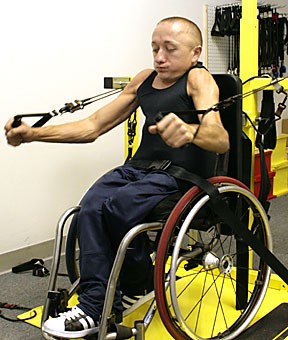Kyle Mutz pulls himself out of his wheelchair and onto the specially designed wide bench that is part of the training regimen he hopes will buy him a ticket to the 2008 Paralympic Games in Beijing.
As Mutz bench presses, his personal trainer, Willie Caldwell, is standing by to spot him and give encouragement.
“”He’s in trouble,”” Caldwell says. “”That third set is gonna be murder for him. He’s already hurting.””
Mutz is clearly out of breath after the first two sets.
“”You’ve gotta show up to play now,”” Caldwell says.
There’s no getting around it. Mutz splays out on the bench for a few seconds, then steels himself for the final set. He shudders as he presses through the exercise.
“”Five, c’mon. Six. Seven. C’mon now. Eight. Two more. Nine. C’mon. One more. C’mon, 10. Gotcha.”” Caldwell catches the weight, and Mutz relaxes.
“”OK, how do you feel?”” Caldwell asks.
“”Out of breath,”” Mutz says.
Mutz, a UA graduate student studying rehabilitation counseling, is a wheelchair sprinter. He is training for the 100- and 200-meter qualifying events in Atlanta next June, when he hopes to earn a spot on the U.S. Paralympic Team.
The bench press is just part of a weekly routine that includes three days in Caldwell’s gym, Mobility Fitness, and six days pushing upwards of 100 miles total with Arizona’s adaptive athletics track and road racing team.
“”Usually at the end of the week when everybody’s ready to party, I’m ready to relax and get some sleep,”” Mutz said. “”But I’m ready to make the Olympic team, so you have to make sacrifices.””
Mutz was born with arthrogryposis, a congenital disorder affecting the joints and muscles. The condition is marked by generalized stiffness of the joints, often accompanied by muscle and nerve degeneration that can result in severely impaired mobility. In other words, Mutz has full feeling in his legs but lacks the muscle necessary to extend or contract them.
“”It’s kind of ironic,”” Mutz said. “”They think it might be caused by lack of activity in the womb. I guess I was kind of lazy, but now I’m the most active in my family.””
Mutz used a walker and crutches until age 5, when it became too difficult to move without a wheelchair. But from the minute he got in a chair, Mutz said he was racing up and down hallways.
When his father saw an ad on television for wheelchair sports, he began taking his son from their home in Floresville, Texas, to San Antonio – about an hour’s drive -ÿseveral times a week.
“”(I) tried every sport, tennis, basketball – the only thing that stuck with me was track,”” Mutz said.
With few exceptions, Mutz trains like any other athlete and sets his goals high. The Paralympic Games are held following the Olympics but in the same venues. For disabled athletes like Mutz, the Games represent the pinnacle of competition.
After narrowly missing qualifying for the 2004 games in Athens, Greece, Mutz is leaving nothing to chance. Eight months removed from the 2008 qualifiers, he already feels he is making strides after taking the extra step to add Caldwell as his trainer. They’ve been working together for almost a month.
“”I’ve seen a pretty big increase in my strength already,”” Mutz said, “”just trimming up and gaining a little more muscle tone.””
Mobility Fitness is unique, as it caters specifically to disabled athletes. Caldwell, a Baylor alumnus and former NCAA champion in the 500m dash and 4x400m relay, designed all the gym’s equipment himself. His workout philosophy involves a holistic approach to developing the wheelchair athlete’s body. The equipment is slightly different, but the approach is the same – the whole body should get a well-rounded workout.
“”Even if they have a disability, we try to work even the disabled parts,”” Caldwell said. “”If they can’t move their legs, we put them on a motorized bike so that their legs will move. We try to make them work out just like an able-bodied person. We try to make it so that there is no limit to what they can do.””
“”I don’t really consider myself to be any different from anybody else,”” Mutz said. “”When I talk to kids and I tell them about sports, I tell them a racing chair is just a different pair of shoes.””
In addition to Caldwell, Mutz has Arizona’s track and road racing coach Pete Hughes spurring him onto bigger and better things. Mutz has already accomplished much in his track career: He is this year’s national champion in the 100m dash and a participant in this summer’s Parapan American Games in Rio de Janeiro, Brazil.
Still, Hughes and Mutz are not satisfied.
“”In my opinion that’s a training event for Beijing,”” Hughes said. “”We want to go eat Chinese food and we want to medal in the Paralympics.””
Hughes tells his team not to cut corners, that with the Paralympics on the horizon, now is the time to kick training into high gear. When Mutz missed a practice because of a flat tire, Hughes suggested that Mutz keep a stockpile of tires.
“”They’ve been training hard up ’till now,”” Hughes said. “”But now it’s time to get all those other parts that you kind of cut corners for when you’re training to be good, but not training to be elite.””
So training will continue unabated until Mutz reaches the Paralympic Games. Practices at 5 a.m., hours in the gym – not to mention Mutz’s graduate studies. He hopes to become a rehabilitation counselor working with military veterans who have newly acquired disabilities.
“”It’s not easy,”” Mutz said. “”It’s an everyday process. It’s not every four years, it’s every day.””









